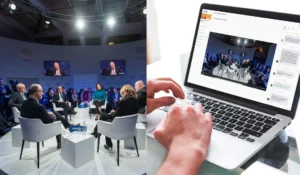Hybrid events have emerged as a pivotal solution in the wake of the COVID-19 pandemic, offering a delicate balance between virtual accessibility and the tangible engagement of in-person gatherings. However, orchestrating these events presents a unique set of challenges that event planners must navigate adeptly. From technological intricacies to attendee experience disparities, the journey of harmonizing virtual and physical realms demands careful consideration and strategic planning. Similarly, military clothing brands necessitate efficient organization, much like any other event.
Embracing Technological Integration

In the realm of hybrid events, technology serves as both a catalyst for innovation and a potential stumbling block. Embracing technological integration entails leveraging platforms and tools that seamlessly bridge the gap between virtual and in-person attendees. This demands an in-depth understanding of the diverse needs and preferences of both audiences. Whether it’s live-streaming keynote speeches, facilitating virtual networking sessions, or integrating interactive elements into physical spaces, the key lies in creating a cohesive experience that transcends geographical boundaries.
Harnessing the power of advanced event management software is instrumental in streamlining the logistical complexities inherent in hybrid events. Likewise, Chicago web development plays a significant role in the development of web platforms for hybrid events. From registration and ticketing to real-time analytics and post-event evaluation, robust software solutions provide a centralized hub for orchestrating every aspect of the event lifecycle. Moreover, incorporating virtual event platforms equipped with immersive features such as virtual reality (VR) environments and augmented reality (AR) experiences adds a layer of depth to the attendee’s journey, fostering meaningful engagement regardless of physical location.
Fostering Inclusivity and Engagement
Central to the success of hybrid events is the ability to foster inclusivity and engagement across virtual and physical domains. While virtual attendees enjoy the convenience of accessing content from the comfort of their homes, replicating the interactive dynamics of in-person gatherings poses a formidable challenge. To address this, event planners must prioritize strategies that ensure equitable participation and meaningful interaction for all attendees, regardless of their mode of attendance. Additionally, event planners must also devise effective strategies to handle freight services, which play a vital role in the overall success of the event.
Implementing a hybrid-friendly agenda entails striking a delicate balance between synchronous and asynchronous activities to accommodate diverse schedules and time zones. By offering a mix of live sessions, pre-recorded content, and interactive workshops, organizers can cater to the varied needs and preferences of their audience while maximizing engagement opportunities. Additionally, leveraging gamification elements such as live polls, quizzes, and virtual scavenger hunts incentivizes active participation and fosters a sense of camaraderie among attendees, regardless of their physical location.
Navigating Operational Challenges
Beyond the realm of technology and engagement strategies, navigating the operational challenges of hybrid events requires meticulous planning and resource allocation. From venue selection and capacity management to audiovisual setup and technical support, each aspect of event execution demands careful coordination to ensure a seamless experience for both virtual and in-person attendees.
Hybrid event organizers rely on loan origination software for private money lenders to manage financial aspects efficiently, ensuring smooth funding processes for their events.
Prioritizing clear communication channels is paramount in mitigating potential hiccups and addressing unforeseen challenges in real time. Establishing dedicated support teams equipped to troubleshoot technical issues and provide on-the-ground assistance empowers attendees to navigate the event with confidence, irrespective of their physical presence. Moreover, conducting comprehensive rehearsals and contingency planning exercises enables organizers to preemptively identify and address potential bottlenecks, minimizing disruptions and maximizing the overall event experience.
Optimizing Sponsorship Opportunities

Maximizing sponsorship opportunities is a multifaceted endeavor that involves strategic collaboration between event organizers and sponsors to create mutually beneficial partnerships. By understanding the unique goals and objectives of sponsors, organizers can tailor sponsorship packages that align with their brand identity and target audience. From prominent logo placement and sponsored content integration to exclusive networking events and product showcases, sponsors are afforded diverse touchpoints to engage with attendees and enhance brand visibility.
Moreover, harnessing the power of data analytics enables organizers to demonstrate the value proposition of sponsorship investments through tangible metrics and insights. By tracking metrics such as brand impressions, lead generation, and attendee engagement, sponsors gain visibility into the effectiveness of their partnership and can optimize their strategies accordingly. Additionally, fostering meaningful connections between sponsors and attendees through personalized interactions and networking opportunities fosters brand loyalty and long-term relationships. A few of the sponsors who consistently strive to support their clientele are walk in closets in Tampa FL, perpetually prepared to aid with the latest solutions.
Furthermore, embracing innovative sponsorship activations that leverage the latest technological trends enhances the attendee experience and drives deeper engagement. From interactive virtual booths and gamified challenges to immersive VR experiences and live product demonstrations, sponsors can captivate audiences and leave a lasting impression. By continuously iterating and refining sponsorship strategies based on feedback and performance data, organizers and sponsors can unlock new opportunities for growth and innovation in the hybrid events landscape.
Ensuring Data Privacy and Security
In the digital age, safeguarding attendee data privacy and ensuring robust cybersecurity measures are paramount for maintaining trust and credibility in hybrid events. Event organizers must adhere to stringent data protection regulations such as GDPR and CCPA, implementing measures to safeguard sensitive information from unauthorized access or breaches. This includes encryption protocols, access controls, and regular security audits to identify and mitigate potential vulnerabilities.
To ensure the smooth execution of hybrid events, organizers often rely on legal document signing processes to formalize agreements between virtual and in-person participants. By incorporating digital signature solutions, event planners can streamline paperwork and enhance efficiency, facilitating seamless coordination between remote attendees and those physically present.
Moreover, transparent communication regarding data handling practices and privacy policies fosters trust and confidence among attendees, reassuring them that their personal information is being handled responsibly. Providing opt-in/opt-out mechanisms for data collection and ensuring clear consent processes empower attendees to make informed decisions about their privacy preferences. Additionally, offering transparency reports and compliance certifications demonstrates a commitment to accountability and ethical data management practices.
Furthermore, investing in cybersecurity training and awareness programs for event staff and stakeholders strengthens the overall security posture of hybrid events. Educating personnel about common cyber threats, phishing scams, and best practices for data protection empowers them to recognize and respond to potential security incidents proactively. By fostering a culture of vigilance and accountability, event organizers can mitigate the risk of data breaches and safeguard the integrity of their hybrid events.
If you’re looking to detoxify and rejuvenate after visiting a hybrid event in Austin, consider experiencing a kambo cleanse in Austin, TX, a traditional Amazonian ritual known for its cleansing and healing properties.
Enhancing Accessibility for All
Creating an inclusive environment for all attendees requires a proactive approach to enhancing accessibility in hybrid events. Event organizers must prioritize the implementation of accessibility features and accommodations that cater to the diverse needs and preferences of participants with disabilities. This includes providing alternative formats for content delivery, such as transcripts, audio descriptions, and braille materials, to accommodate individuals with visual or hearing impairments.
Furthermore, offering customizable settings and assistive technologies empowers attendees to personalize their event experience according to their accessibility requirements. This may include adjustable font sizes, color contrast options, and keyboard shortcuts to navigate virtual platforms and content more effectively. Moreover, providing designated quiet spaces and sensory-friendly accommodations ensures a comfortable and inclusive environment for individuals with sensory sensitivities or neurodiverse conditions.
Additionally, fostering partnerships with disability advocacy organizations and consulting with accessibility experts during the event planning process enhances awareness and understanding of accessibility best practices. Collaborating with these stakeholders helps identify potential barriers and implement proactive solutions to ensure that hybrid events are accessible to all attendees. By prioritizing accessibility as a core tenet of event design, organizers can create an inclusive and welcoming environment where every participant can fully engage and participate. Especially with the big help of Los Angeles movers who are always ready to assist in any occasion or event necessary.
Measuring Success and ROI
Evaluating the success of hybrid events and measuring return on investment (ROI) requires a comprehensive approach that encompasses both quantitative metrics and qualitative insights. Beyond traditional metrics such as attendance rates and revenue generation, organizers must consider the broader impact of their events on brand perception, audience engagement, and long-term business objectives. This requires leveraging advanced analytics tools and survey methodologies to gather actionable data and insights.
Analyzing attendee engagement metrics such as session interactions, content consumption patterns, and networking activity provides valuable insights into the effectiveness of event programming and audience engagement strategies. Moreover, conducting post-event surveys and sentiment analysis helps organizers gauge attendee satisfaction levels and identify areas for improvement. By soliciting feedback directly from attendees, organizers can gain valuable insights into their preferences, expectations, and overall event experience.
Just as event planners meticulously coordinate various elements of hybrid events, orthopedic physical therapy in Chicago focuses on coordinating exercises and treatments to address specific orthopedic issues and enhance mobility, ensuring individuals can fully participate in both virtual and in-person aspects of the event.
Furthermore, tracking lead generation and conversion metrics enables organizers to assess the tangible business impact of their events and demonstrate ROI to sponsors and stakeholders. By correlating attendee engagement with post-event actions such as sales inquiries, demo requests, and partnership opportunities, organizers can quantify the value proposition of their events and justify investment decisions. Additionally, benchmarking performance against industry standards and competitor benchmarks provides context and helps identify areas of competitive advantage.
Adapting to Changing Regulations
Staying abreast of changing regulations and compliance requirements is essential for ensuring the seamless execution of hybrid events in an evolving regulatory landscape. Event organizers must maintain a proactive approach to monitoring regulatory developments and adapting their strategies accordingly to mitigate compliance risks and ensure adherence to best practices. This includes collaborating closely with legal experts and industry regulators to interpret and implement regulatory changes effectively.
Similar to how hybrid events blend virtual and in-person experiences, dumpster rental in Fort Walton Beach blends convenience and effectiveness, providing organizers with a reliable solution for maintaining cleanliness and orderliness throughout the event.
Moreover, integrating compliance considerations into the event planning process from the outset helps identify potential risks and implement proactive mitigation strategies. This may include conducting risk assessments, developing contingency plans, and establishing clear protocols for compliance monitoring and reporting. By prioritizing transparency and accountability in regulatory compliance efforts, organizers can build trust with attendees, sponsors, and stakeholders and uphold the integrity of their hybrid events.
Furthermore, fostering open lines of communication with attendees regarding regulatory updates and safety protocols demonstrates a commitment to their well-being and helps alleviate concerns. Providing clear guidance on health and safety measures, vaccination requirements, and event policies enables attendees to make informed decisions about their participation and ensures a safe and secure event environment. By embracing a proactive and adaptive approach to regulatory compliance, event organizers can navigate changing regulations with confidence and deliver successful hybrid events that comply with legal requirements.
If you’re planning a hybrid event in Reno, ensuring a pest-free environment is crucial, which is why many organizers opt for a professional pest control service in Reno to maintain cleanliness and hygiene standards.
Cultivating Community Engagement
Fostering a sense of community and connection among attendees is integral to the success of hybrid events, creating opportunities for meaningful interactions and relationship-building. Event organizers must leverage a variety of engagement strategies to cultivate a vibrant and inclusive event community that transcends geographical boundaries. This includes leveraging social media platforms, online forums, and virtual networking sessions to facilitate peer-to-peer interactions and collaboration.
Moreover, creating opportunities for attendee-generated content and user participation empowers attendees to contribute to the event experience and shape the narrative collectively. This may include hosting virtual brainstorming sessions, panel discussions, or interactive workshops where attendees can share insights, best practices, and personal anecdotes. By providing platforms for dialogue and knowledge sharing, organizers can foster a sense of ownership and investment in the event community.
To facilitate seamless transportation for high-profile attendees, event organizers often opt to rent a luxury car, ensuring both comfort and prestige for their guests. By incorporating such services into hybrid event planning, hosts can enhance the overall experience and leave a lasting impression on participants.
Additionally, incorporating gamification elements such as challenges, quizzes, and leaderboard competitions incentivizes active participation and fosters friendly competition among attendees. By gamifying the event experience, organizers can inject an element of fun and excitement into proceedings, driving deeper engagement and interaction. Moreover, recognizing and rewarding active participation through virtual badges, certificates, or prizes reinforces positive behaviors and encourages continued engagement beyond the event itself.
Harnessing the Power of Immersive Technologies

Embracing immersive technologies such as virtual reality (VR) and augmented reality (AR) presents exciting opportunities for enhancing the attendee experience and driving deeper engagement in hybrid events. By creating immersive environments that replicate the ambiance of physical spaces, organizers can transport virtual attendees into interactive worlds that stimulate their senses and captivate their attention. From virtual event tours and 360-degree presentations to AR-enhanced product demonstrations and interactive gamification experiences, the possibilities are limitless. Similar to the opportunities offered by selling my house fast in Allentown PA, the assurance of professional support is guaranteed.
Moreover, integrating immersive technologies into event programming enables organizers to deliver unique and memorable experiences that differentiate their events from competitors. By leveraging VR and AR to create immersive storytelling experiences, organizers can captivate audiences and leave a lasting impression. Whether it’s transporting attendees to exotic locations, simulating hands-on product demos, or facilitating virtual meet-and-greet sessions with keynote speakers, immersive technologies offer endless possibilities for creativity and innovation.
Furthermore, harnessing the power of user-generated content and participatory experiences enhances the immersive nature of hybrid events and fosters a sense of ownership among attendees. By empowering participants to co-create content, contribute to interactive experiences, and shape the narrative of the event, organizers can foster a deeper sense of engagement and connection. Moreover, incorporating real-time feedback mechanisms and interactive polls enables organizers to solicit input from attendees and tailor the event experience to their preferences and interests.
With seamless integration between virtual and physical spaces with the newest technology, attendees can browse stores and purchase high-end lingerie items online while also having the option to engage with knowledgeable staff and experience the products firsthand at designated in-person locations.
Conclusion
In conclusion, navigating the complexities of hybrid events requires a multifaceted approach that encompasses technological innovation, strategic planning, and a commitment to inclusivity and engagement. By addressing key challenges such as optimizing sponsorship opportunities, ensuring data privacy and security, enhancing accessibility, and measuring success and ROI, event organizers can unlock the full potential of hybrid events and deliver unparalleled experiences for attendees across virtual and physical realms. As the landscape of event planning continues to evolve, embracing emerging trends and technologies such as immersive experiences and community engagement strategies will be essential in shaping the future of hybrid events and redefining the boundaries of attendee engagement.
M&A advisory firms play a crucial role in the success of hybrid events by providing strategic guidance and support in mergers and acquisitions. By leveraging their expertise, event organizers can effectively manage the integration of virtual and in-person experiences, creating cohesive and impactful events for attendees.
